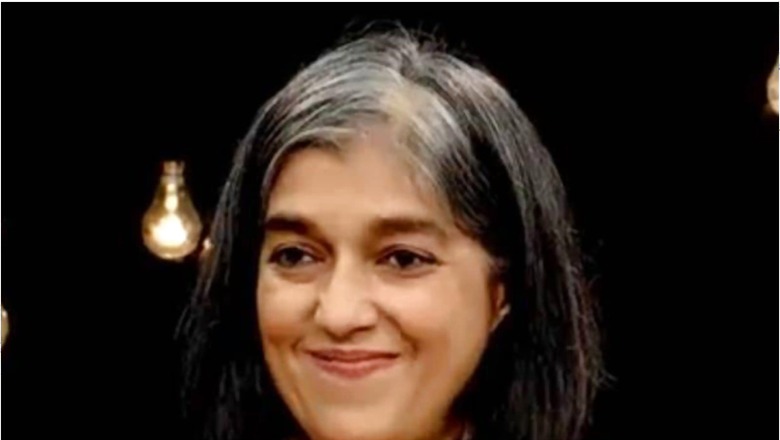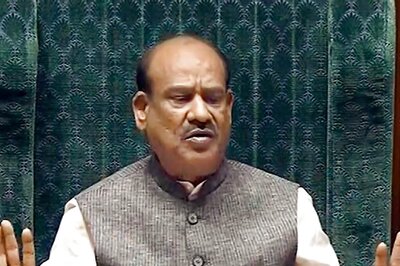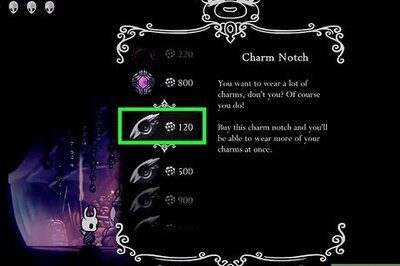
views
Ratna Pathak Shah has been one of the formidable names in Indian television, cinema and theatre, reinventing herself with each generation and delivering some remarkable performances. She is playing one of the lead roles in the Abhishek Jain-directed Hum Do Humaare Do, that releases on Disney+ Hotstar on October 29. In a long conversation with News18, she spoke about her love for rehearsals before going on set, the fading star system in Bollywood and the stereotypical roles her mother, Dina Pathak, was forced to play. Excerpts:
It has been close to four decades that you have been working in the industry. What do you look for in a script when it comes to you?
I am a great believer in variety. I don’t like to do the same thing over and over again. And therefore, it’s fun to come across a person that tells me more about the way people live, think and behave. The script is usually the mode through which all this comes to you. I always insist on reading this script. I really spend time thinking about it. And that’s what helps me to choose what I’m going to do. Of course, the director matters. If it’s a person whose work I’ve admired, it helps to a larger extent. Apart from that I also take into consideration who my co-actors are. But having said that, I’ve worked with a whole lot of first time directors, and quite honestly, I’ve never been disappointed leaving aside on a couple of occasions. I think first time directors bring a great passion and a great energy to a story, to a project, and that totally gets me thrilled.
Was that the case with Hum Do Hamare Do? Director Abhishek Jain is making his Hindi debut with the film.
Oh, yes, absolutely. Abhishek is a completely unknown entity. I had seen a few of his Gujarati films. And I was very happy that there was somebody doing stuff in Gujarati, which was so significantly different from the kind of mundane films that we see in that language. I am afraid Gujarati films have been quite embarrassingly bad for a very long time. And I feel Abhishek was part of the revival of Gujarati filmmaking. So I like the kind of stories he was trying to tell. That definitely helped me to make up my mind for Hum Do Hamare Do.
Is there a way you approach a role once you agree to do it?
I read the script very diligently. And very many times, not only before I start prepping the film, but even during the film, and the shooting, because the script is like a detective story. It tells you everything you need to know about your character. The more you read it, the more you get to know. So just one single reading is not sufficient. I also like to rehearse with other actors. You see, I come from the theater, so I know the benefits of rehearsal. I know how much you can discover about yourself, and about a part when you rehearse it regularly. Film actors are not very happy to rehearse as they feel they will lose the spontaneity. I’d like to say that I don’t think there is anything like spontaneity in acting.
And why do you say that?
(Laughs) Spontaneity, the way Hindi film actors understand it, means being allowed to do the same thing over and over again, something that worked once in a film, you give yourself the leeway to do it over and over again. I think that’s laziness, not spontaneity. Spontaneity occurs, because much has been planned beforehand and has been worked on. You’ve got to put yourself into a state where spontaneous ideas can occur to you. For me, rehearsal is extremely important. And I’m glad to see that younger actors don’t mind rehearsing nowadays. They’re quite open about the idea of meeting ahead of time rehearsing, talking about the film. I like that kind of interaction. It gives everyone a chance to understand different aspects of the project that you’re working on.
I am sure it would have been a satisfying experience on the sets of Hum Do Humare Do when you have like-minded actors like Paresh Rawal and Rajkummar Rao who belong to theater background.
It makes my job pleasurable for sure. When there are like-minded people working together on any project, it makes the whole process a great deal of fun, and it makes it meaningful, because you’re all working together towards an end. I remember the time when the stars ruled the roost, and even directors had no way of getting stars to change their way of behaving, do anything according to what they wanted. The stars were an entity unto themselves, I feel very happy that that time has, more or less, come to an end, I can’t say for sure that it has. But to a great extent, I think it is fading. And I love that. When we were shooting for Kapoor And Sons, we were all living together, we had a house that we were shooting in. A large part of the film was shot in that house, it began to feel like home, the fact that all of us could share a meal together and a drink together after shoot and just sit around and be together like a family would, I think it contributed a great deal to the way in which we acted. I think that is the right way to go about it.
But not always, different people have different ways of operating. And when you’re working with different kinds of people, your job is to be able to fit in. In Hum Do Hamare Do, we just happen to be a whole bunch of actors who were very happy to be rehearsing together. And that’s true for Rajkummar as it is for Kriti or Paresh, of course, who I have known for many years and have worked with before. But even the others I met this time for the first time. It was fun to be able to share ideas and to work together like that.
Like you mentioned, the star system is fading…
Ah, let’s not speak too soon. Aise cheezen nahi bolte (laughs).
What I want to say is that in the past, you mentioned how the industry hasn’t been able to write good roles for Shah Rukh Khan or Deepika Padukone. Do you see that changing, especially for actors of your age?
Yes and thank god for that. The credit goes to good writing and a bunch of young directors who want to think out of the box, who don’t want to be telling the same story over and over again. I mean, can you believe we have a population of 1 billion in this country, and we import the same story for 100 years? Filmmaking is a 100 year old enterprise in our country, right? And until recently, we told the same story over and over again. For many years Hindi films has always been about rich girl and poor boy and vice-versa or a zamindar against a peasant or industry magnate against mazdoor. For 100 years, we’ve done this. Unfortunately, Hindi cinema thinks in stereotypes. They find it difficult to think outside stereotypes. In India, we find it difficult to think outside stereotypes.
And suddenly, we’ve realized that there’s a story practically under every bush in this country. And there are people who are able to put those stories out. I’m so happy that I am part of this world at the moment. I’ve seen my husband (Naseeruddin Shah) struggle with the rubbish scripts he used to get. And he was among the better known actors at his time. Of course he got a chance to do other good films also, but there are so many actors who have had to deal with poor quality writing for their entire lives. My mother (Dina Pathak) was one such actor. She was a wonderful actress and her earlier work was so good. But most of her film’s did not give her half a chance to do what she was capable of.
She was largely stereotyped as a poor mother.
Absolutely. The kind of things Ma did in the last few years of her life were stereotypical performances. She just became a kind mother. The only thing that changed was the colour of her sari. My sister (Supriya Pathak) and I would joke around saying that now Ma will give this expression. Unfortunately she had to carry on with the work she got because our father had passed away and she had a family to take care of.
Was your mother your inspiration to become an actress?
Yes. Her impact on my abilities as an actress has been very great. She watched everything we did with a lot of interest and she observed the smallest of the things. She was one of our biggest critics. She always spent time explaining what she did or did not like.
Coming back to Hum Do Humare Do, the film talks about relationships. Can you tell us the kind of relationship that you share with your husband Naseeruddin Shah?
I don’t know how to describe it. We have shared an amazing relationship and don’t have any regrets. I have managed very happily with him, without any trouble at all. Surprisingly, what I remember the most is the amount of fun we had together. We didn’t expect that. We thought we would be together, we would be happy, and we would have children and we would work and blah blah, the usual things that people think.
Read all the Latest News , Breaking News and IPL 2022 Live Updates here.

















Comments
0 comment